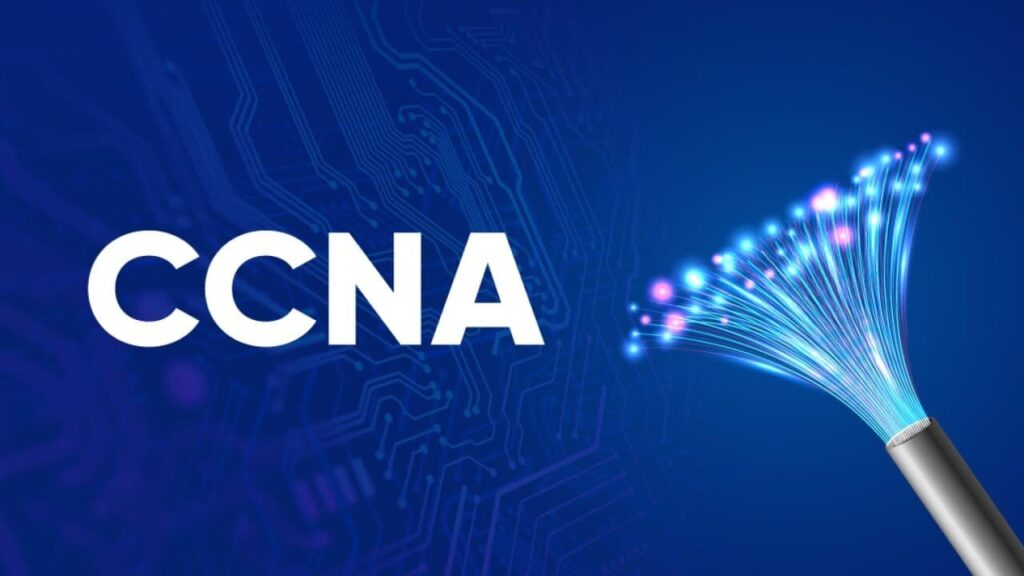
TRAIN FOR NEXT GENERATION
CCNA certification
The CCNA certification is highly valued in the IT industry, serving as a foundational credential that opens doors to further career advancement and specialization. IT professionals aiming to establish their credibility and expertise recognize it as an essential milestone in their journey.
A pivotal aspect of the CCNA certification is its thorough coverage of fundamental technical skills. From grasping the nuances of networking concepts to troubleshooting network issues, the certification provides candidates with a comprehensive skill set crucial for success in entry-level networking roles. Additionally, the inclusion of topics such as network security and wireless technologies reflects the dynamic nature of networking and the growing significance of these areas in modern IT environments.
Achieving the CCNA certification requires dedicated preparation, as candidates must demonstrate proficiency in various areas through the certification exam. This exam not only tests theoretical knowledge but also evaluates practical skills through simulations, ensuring that certified individuals can effectively apply their knowledge in real-world networking scenarios.
what is the CISE Academy CCNA certification ?
____________________
The CCNA certification, offered through CISE Academy, is a foundational credential in the field of networking, confirming individuals’ competencies in managing, diagnosing, and securing small to medium-sized enterprise networks. This comprehensive course covers a wide array of topics, evaluating candidates’ comprehension of fundamental networking concepts such as the OSI and TCP/IP models, various network types, and the functionalities of essential networking devices like routers and switches.
A key focus of the CCNA course is on IP addressing and subnetting, ensuring that candidates grasp these critical concepts thoroughly. The curriculum also delves into routing protocols like RIP, OSPF, and EIGRP, as well as switching concepts including VLANs and STP. Additionally, students will gain knowledge about important network services such as DHCP and DNS, which are vital for network operation and management.
Furthermore, the CCNA course at CISE Academy covers WAN technologies extensively, including leased lines, DSL, and MPLS. Students will learn how to configure and troubleshoot connections using protocols like PPP and HDLC. This broad coverage of networking technologies prepares individuals for diverse roles in the information technology industry, making the CCNA certification a valuable asset for those looking to pursue a career in networking.

Overall, the CCNA certification offered by CISE Academy plays a crucial role in establishing individuals’ expertise in essential networking concepts and technologies. It serves as a stepping stone for entry into the networking field, opening up a plethora of career opportunities in the ever-evolving realm of information technology.
Key Advantages of CCNA Certification
____________________
The CCNA certification serves as a respected starting point for those embarking on a career in IT, verifying essential competencies in hardware, software, and networking.
- Industry Recognition: Gain industry-wide acknowledgment for your networking expertise.
- Career Advancement: Propel your career with recognized networking skills.
- In-depth Knowledge: Acquire comprehensive understanding of networking principles.
- Hands-on Experience: Develop practical skills through hands-on networking practice.
- Networking Opportunities: Connect with professionals and expand your network in the field.
- Foundation for Further Certifications: Establish a strong base for pursuing advanced networking certifications.
CCNA certification Information
____________________
Module 01: Networking Fundamentals
Module 02:IP Addressing and Subnetting
Module 03: Routing Technologies
Module 04:Switching Technologies
Module 05:Network Services
Module 06:Network Security
Module 07: WAN Technologies
Module 08: Wireless Technologies
Module 09: Network Troubleshooting
Module 10: Cisco IOS Basics
Entry-level network professionals
Specializing IT technicians
Validating network administrators
Advancing networking careers
IT career pursuing students
Fundamental networking understanding
Job prospects enhancing
Network engineering career preparation
Cisco networking expertise
Technology passion, networking learning
1-Practical Skills: Hands-on learning for real-world application.
2-Certification Path: Clear, efficient route to accreditation.
3-Mobile Connectivity: Focus on wireless technology integration.
Industry-Recognized Certification
Comprehensive Curriculum
Practical Skills Development
Career Advancement
Flexibility in Learning
Up-to-date Content
Streamlined Certification Path
Focus on Automation
Cloud Integration
Security Awareness
CCNA certification FAQs
Who should pursue CCNA?
CCNA is ideal for individuals aspiring to build a career in networking or seeking to validate their networking skills.
What topics does CCNA cover?
CCNA covers a broad range of networking topics including IP addressing, routing, switching, network security, and WAN technologies.
What are the benefits of earning CCNA certification?
CCNA certification enhances job prospects, validates networking skills, and provides opportunities for career advancement in the IT industry.
What career opportunities are available after earning CCNA certification?
CCNA certification opens doors to various job roles including network administrator, network engineer, systems administrator, and IT support specialist.
Are there specialized CCNA certifications for specific technology tracks?
Yes, Cisco offers specialized CCNA certifications in areas like cybersecurity, wireless networking, and cloud computing, catering to specific career paths within networking.
Copyright © 2024 CISE Academy